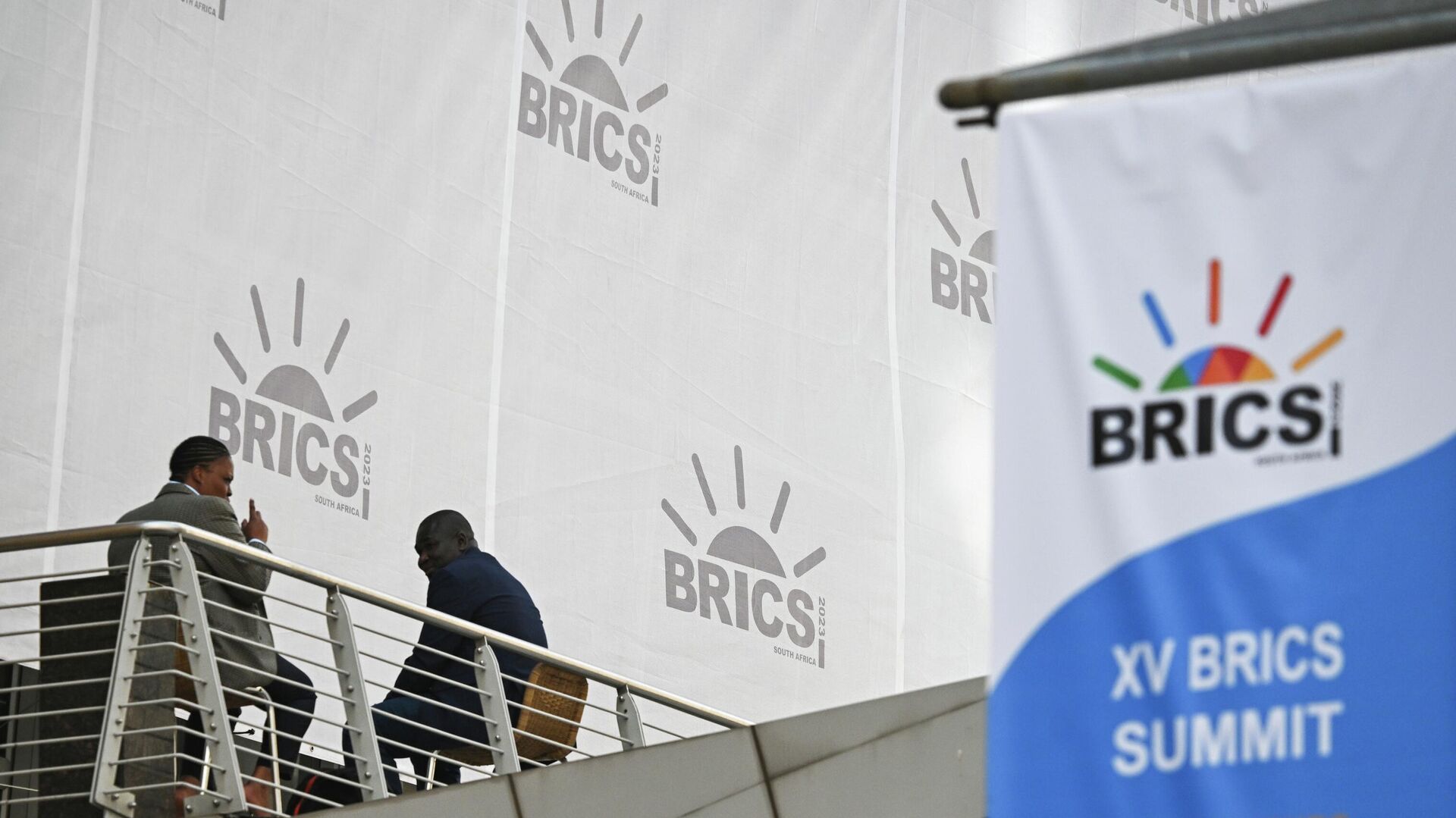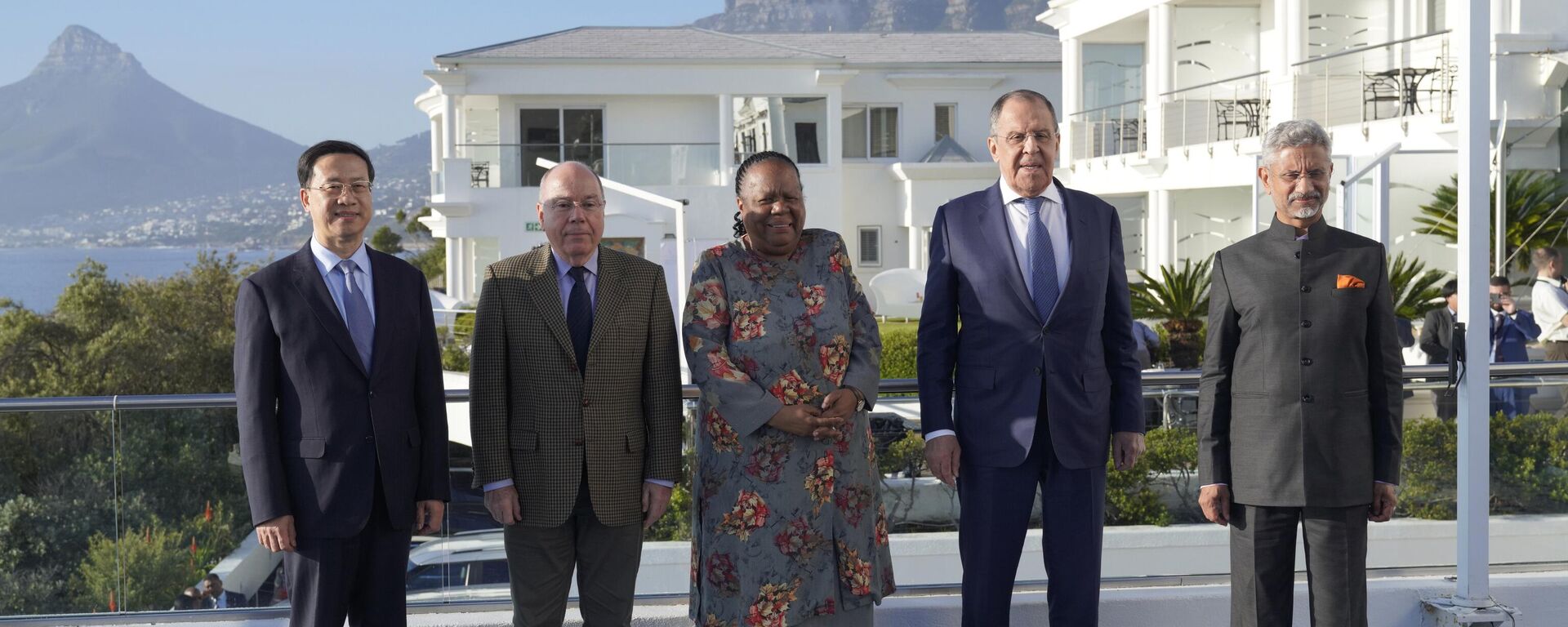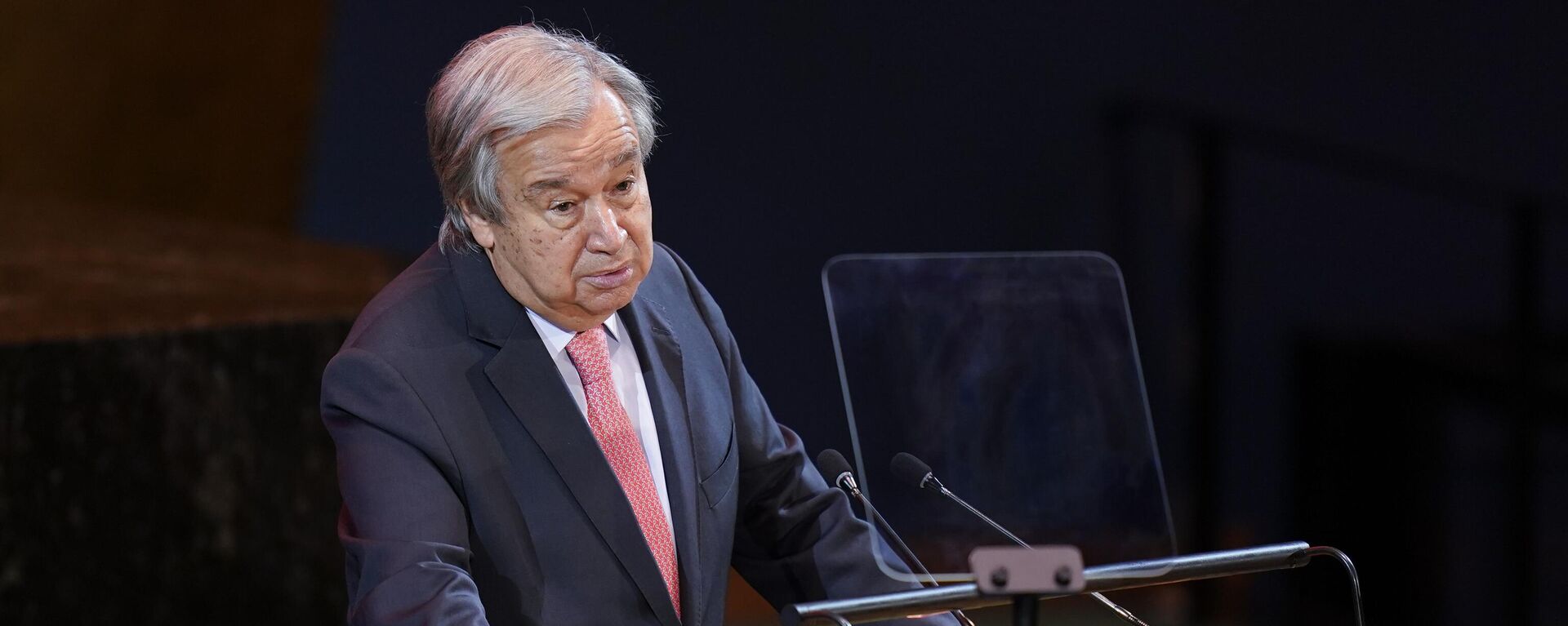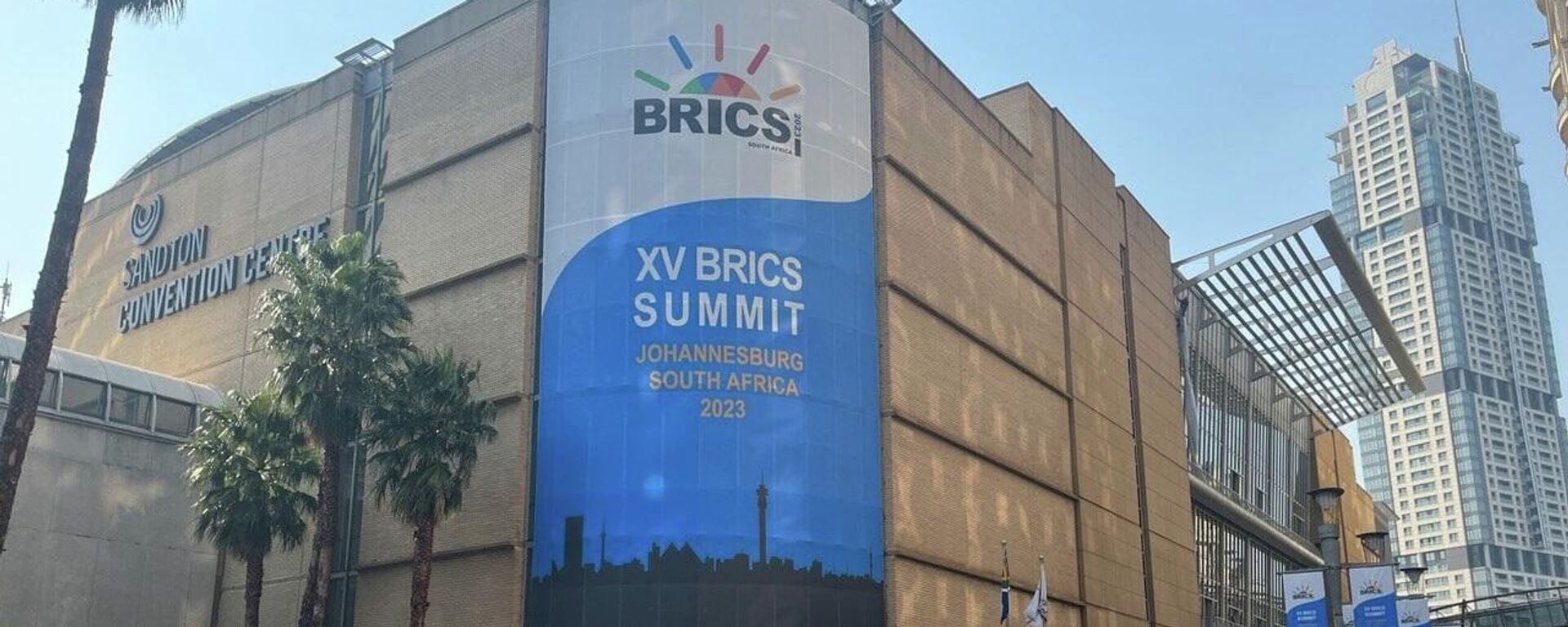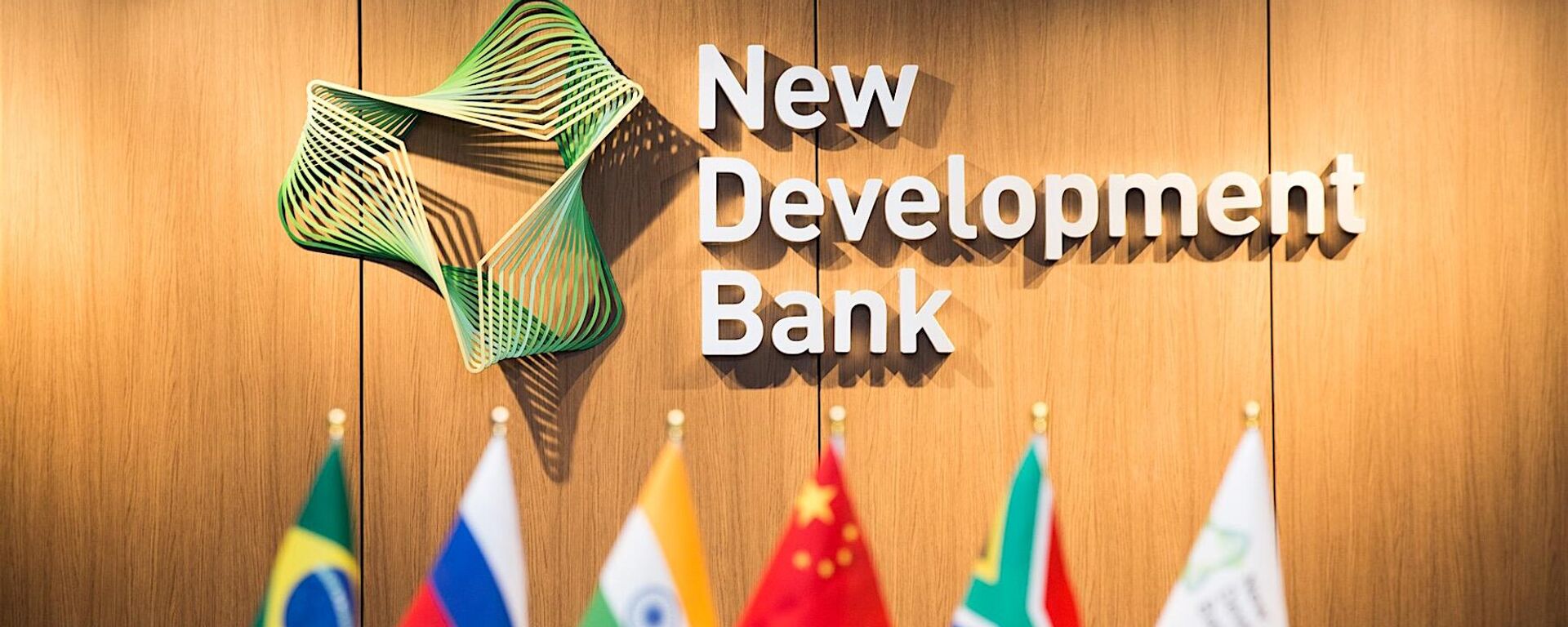https://en.sputniknews.africa/20230825/brics-expansion-fills-up-missing-pieces-zambian-scholar-1061623499.html
BRICS Expansion 'Fills Up Missing Pieces': Zambian Scholar
BRICS Expansion 'Fills Up Missing Pieces': Zambian Scholar
Sputnik Africa
The 15th BRICS Summit, held on 22-24 August in South Africa's Johannesburg, resulted in the invitation of Argentina, Egypt, Ethiopia, Iran, Saudi Arabia and... 25.08.2023, Sputnik Africa
2023-08-25T16:37+0200
2023-08-25T16:37+0200
2023-08-25T16:46+0200
2023 brics summit in johannesburg
brics
brics summit
brics expansion
zambia
ethiopia
saudi arabia
egypt
african union (au)
international monetary fund (imf)
https://cdn1.img.sputniknews.africa/img/07e7/08/19/1061623827_0:41:3033:1747_1920x0_80_0_0_7dbc3422d959ed114f2f6c1d0fe23e83.jpg
The latest wave of BRICS expansion came in order to cement the bloc's position as alternative globally, Lubinda Haabazoka, Director Graduate School of Business, University of Zambia told Sputnik Africa.Moreover, after the expansion, the emerging economies will be able to boost trade with each other, be less dependent on the developed world, he stressed.The speaker further noted that no other nation will be able to "bully" the developing nations economically in case the future BRICS development gains success.According to him, developing countries have no voice in different institutions, such as IMF or the World Bank.In contrast, the BRICS expansion has been perceived as an opportunity for the emerging economies to be heard, according to the speaker.The scholar resembled about the equity principle of the group, underlined that no actor within BRICS is eager to prevail over another one.Apart from that, he stressed that using the US dollar in trade and economic relations puts the developing nations and especially that from the African continent in a disadvantageous position, unlike the US that simply prints the greenbacks without any limits.In this regard, African nation's local currencies' utilization is highly awaited, Haabazoka noted.According to him, the functioning of the BRICS will become more efficient after its expansion since the bloc will be more complete, the nations will complement each another.Economically speaking, the bloc is also going to become more powerful, he stated, in particular via creating an alternative currency.According to him, the bloc's influence towards global balance of power is great while its members have large reserves and amounts of various goods and resources. Speaking about the group's extension, he stressed that the six nations that have been invited to the bloc – Argentina, Egypt, Ethiopia, Iran, Saudi Arabia and the UAE – were chosen in accordance with a geographical factor, as well as due to various strong sides of these countries.For instance, the African Union's secretariat, the African Union Commission, is located in Ethiopia, and Egypt, that was also invited to BRICS, is Africa’s "major power", he stressed.As for other non-African nations that were invited to join BRICS in early 2024, Haabazoka stated that they also have their advantages, the bloc itself, as well as other BRICS-partnering nations will get profit from future cooperation.Africa is the main benefactor of the group's extension, the scholar stressed.Moreover, according to Haabazoka, after the new member enter the group, Africans will perceive the bloc "as their own organization".Haabazoka expressed hope for the BRICS New Development Bank’s investment to Africa and some member-states' participation in development process.The African nations are overwhelmed with the group's enlargement, many nations are willing to join, and they need to – despite external opposition.
https://en.sputniknews.africa/20230821/brics-towards-a-just-world-order-1061504339.html
https://en.sputniknews.africa/20230822/un-chief-to-speak-at-brics-summit-departs-to-s-africa-spokesperson-1061513551.html
https://en.sputniknews.africa/20230821/indias-deputy-foreign-minister-says-country-has-positive-intent-on-brics-expansion-1061499112.html
https://en.sputniknews.africa/20230821/south-africa-receives-over-5bln-from-brics-bank-for-infrastructure-projects-1061485347.html
zambia
ethiopia
saudi arabia
egypt
Sputnik Africa
feedback@sputniknews.com
+74956456601
MIA „Rossiya Segodnya“
2023
News
en_EN
Sputnik Africa
feedback@sputniknews.com
+74956456601
MIA „Rossiya Segodnya“
Sputnik Africa
feedback@sputniknews.com
+74956456601
MIA „Rossiya Segodnya“
brics, brics summit, brics expansion, zambia, ethiopia, saudi arabia, egypt, african union (au), international monetary fund (imf), lubinda haabazoka
brics, brics summit, brics expansion, zambia, ethiopia, saudi arabia, egypt, african union (au), international monetary fund (imf), lubinda haabazoka
BRICS Expansion 'Fills Up Missing Pieces': Zambian Scholar
16:37 25.08.2023 (Updated: 16:46 25.08.2023) The 15th BRICS Summit, held on 22-24 August in South Africa's Johannesburg, resulted in the invitation of Argentina, Egypt, Ethiopia, Iran, Saudi Arabia and the UAE to join the group from January 2024.
The latest wave of BRICS expansion came in order to cement the bloc's position as alternative globally, Lubinda Haabazoka, Director Graduate School of Business, University of Zambia told Sputnik Africa.
"The expansion of BRICS has come to cement BRICS position as an alternative in the world," Haabazoka stated.
Moreover, after the expansion, the emerging economies will be able to boost trade with each other, be less dependent on the developed world, he stressed.
"And I think for the first time, we're going to achieve south-south trade. Trade has normally been dictated or made between the developed countries and developing countries. Now we are going to see that emerging economies are now going to dominate and learn how to do business with [each other]," Haabazoka stated.
The speaker further noted that no other nation will be able to "bully" the developing nations economically in case the future BRICS development gains success.
"If this is going to be a success and there will be independence in the way that these countries do business, some provide raw materials and some provide finished goods, I don't think any other single country is going to have instruments of bullying other countries in terms of sanctions and other instruments that are normally used to control the development of other countries," he said.
According to him, developing countries have no voice in different institutions, such as IMF or the World Bank.
"Experience has confirmed that the developing countries basically had no say in the way multilateral institutions like the World Bank, the IMF were running and the United Nations had no representation for developing countries on the Security Council, there was no veto power, not even for a bloc such as the African Union (AU)," Haabazoka stated.
In contrast, the BRICS expansion has been perceived as an opportunity for the emerging economies to be heard, according to the speaker.
"The expansion of BRICS has long been overseen as that alternative that is going to provide a voice for developing countries in the world to be able to have a say in how the world should move," he stated.
The scholar resembled about the equity principle of the group, underlined that no actor within BRICS is eager to prevail over another one.
"And no country under BRICS wants to dominate the other. So I think this is going to be a huge success," the Zambian scholar noted.
Apart from that, he stressed that using the
US dollar in trade and economic relations puts the developing nations and especially that from the African continent in a disadvantageous position, unlike the US that simply prints the greenbacks without any limits.
"So this puts at a disadvantage, especially African countries that have to produce and sell something for them to get the reserve currency, like the U.S. dollar. But the US simply needs to go and print money. When we had COVID, when we had the 2008 economic crisis, money was just printed, dollars were printed, and they were given to big US corporations. They were given to European countries, and Africa did not receive anything. And Africa unfortunately cannot print [money], because the international financial architecture was created that first for us to do international trade we need the dollar. So with the dollar countries, especially the [African] countries, are remaining poor, whereas the developed countries are remaining more rich because they have the ability to print money," Haabazoka said.
In this regard, African nation's local currencies' utilization is highly awaited, Haabazoka noted.
"The launching of a national payment instrument based on African national currencies is one that the whole world has been waiting for. You see, after the formation of the Bretton Woods institution, some countries are able to print their own money and compete with those countries that are unable to print their own money," Lubinda Haabazoka mentioned.
According to him, the functioning of the BRICS will become more efficient after its expansion since the bloc will be more complete, the nations will complement each another.
"I think that BRICS is going to be more efficient because it's bringing in countries that are going to fill up the missing pieces. When you look at Saudi Arabia, like I mentioned earlier, Saudi Arabia is a major supplier of oil. And in this case, you can even see that the oil politics are going to be settled right there in BRICS without even having to rush to OPEC," he said.
Economically speaking, the bloc is also going to become more powerful, he stated, in particular via creating an alternative currency.
"In terms of creation of an alternative currency, so that people rid themselves of the dollar, I think this is going to bring more efficiency, and we hope that BRICS puts in structures to be able to admit also other member countries. The bigger the bloc, the [more] powerful their members, in terms of economies, that join, the better," the speaker pointed out.
According to him, the bloc's influence towards global balance of power is great while its members have large reserves and amounts of various goods and resources.
"When taking into account the economies of the proposed new member states, the impact for BRICS expansion on the global power balance is very huge. On one hand you have China, which is a value addition a country, a manufacturer of various goods and products. China is able to supply all other member states with finished products and other services. Then when you look at raw materials, you have countries like Russia that are in the bloc that are able to provide that. Brazil is there. If you look at fuel sufficiency, Russia, Saudi Arabia. When you look at fertilizer. So in some sense, BRICS is a self-contained institution that has both raw materials and finished products. When you talk about the military, the military might is there in the BRICS. When you talk about the raw materials, they are in abundance. When you talk about finished products and value addition, it's there," Haabazoka noted.
Speaking about the group's extension, he stressed that the six nations that have been invited to the bloc – Argentina, Egypt, Ethiopia, Iran, Saudi Arabia and the UAE – were chosen in accordance with a geographical factor, as well as due to various strong sides of these countries.
For instance, the African Union's secretariat, the African Union Commission, is located in Ethiopia, and Egypt, that was also invited to
BRICS, is Africa’s "major power", he stressed.
"I think that the choice of countries Argentina, Egypt, Iran, the United Arab Emirates, Saudi Arabia and Ethiopia to be new members was made based on their importance in the various geographical locations. When you look at Ethiopia, for example, Ethiopia houses the headquarters of the African Union. Ethiopia is a fast-developing country. When you look at Egypt, it's a major power in Africa and has the largest army, for example, and one of the most interesting economies in the world," he stated.
As for other non-African nations that were invited to join BRICS in early 2024, Haabazoka stated that they also have their advantages, the bloc itself, as well as other BRICS-partnering nations will get profit from future cooperation.
"When you look at the United Arab Emirates, I mean, it's no secret that this is a fast developing country and as such huge influence. Saudi Arabia is basically the anchor of the petrodollar system. And if Saudi Arabia joins BRICS and BRICS created currency, I think you're going to see much better things coming up in the world and the benefits will flow to countries that surround these countries, like Iran, like the UAE, Saudi Arabia, Egypt, Argentina and even Ethiopia. So, other countries that do business with these countries and that live in the surrounding regions are also going to benefit from the same. The expansion of BRICS will not only bringing economic development among BRICS nations, but also countries that closely work with the BRICS members," Haabazoka said.
Africa is the main benefactor of the group's extension, the scholar stressed.
"Now we have Egypt to be able to pull together African Arab countries. We have Ethiopia also dealing with countries above the equator. And it being the center is more like bringing together the African Union into BRICS. So the expansion is quite interesting. And I think Africa is going to be a major benefactor. Ethiopia is the capital city of Africa [as it hosts the AU’s Commission]. And bringing a country whose capital is the capital city of the African continent will basically link all embassies, all communication and all countries with BRICS. So it makes it very easy for BRICS to deal with the African continent," he stated.
Moreover, according to Haabazoka, after the new member enter the group, Africans will perceive the bloc "as their own organization".
"Africa [...] I think is one of the most represented [among] all continents in the world in BRICS. So Africans are going to consider this as their own organization. And indeed, BRICS is basically an African project," he outlined.
Haabazoka expressed hope for the BRICS New Development Bank’s investment to Africa and some member-states' participation in development process.
"So, we hope to tap into funding from the New Development Bank, also known as the BRICS bank, to tap into the resources from China, for example, in terms of infrastructure development, from India, in terms of trade, pharmaceuticals, Russia – mineral resources, fertilizers and other equipment, both military and useful agriculture. We hope to see Russian vehicles on the African continent," the speaker said.
The African nations are overwhelmed with the group's enlargement, many nations are willing to join, and they need to – despite external opposition.
"This is a very good development. There are a lot of African countries that want to join BRICS. Algeria is one of them. Nigeria, which is a giant of Africa, also wants to join that. A lot more countries, if you saw the attendance, it was very huge," Haabazoka noted. "I'm sure countries like Zimbabwe are also willing to join. So I think the mood towards BRICS is quite overwhelming and the sooner these countries are admitted into BRICS, the better, because there's a lot of pressure coming from other parts of the world to ensure that BRICS doesn't grow. So this is an opportunity that we should look at to ensure that BRICS expands."
